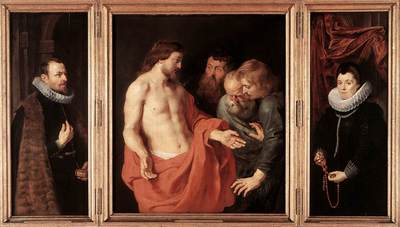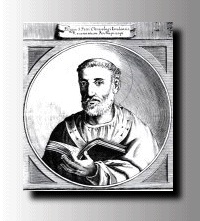 The Lord led the just in right paths, and showed him the kingdom of God.
The Lord led the just in right paths, and showed him the kingdom of God.Saints: July 2009 Archives
 The Lord led the just in right paths, and showed him the kingdom of God.
The Lord led the just in right paths, and showed him the kingdom of God.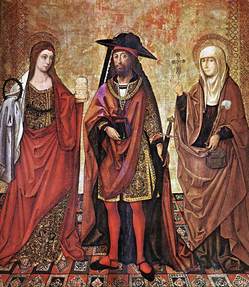 Heavenly Father, your son was received as an honored
and welcome guest in the home of Bethany. Keep us close to the Master in our
prayer and work that, blameless in his sight, he may welcome us into our
eternal home, who lives and reigns with you and the Holy Spirit, one God, for
ever and ever.
Heavenly Father, your son was received as an honored
and welcome guest in the home of Bethany. Keep us close to the Master in our
prayer and work that, blameless in his sight, he may welcome us into our
eternal home, who lives and reigns with you and the Holy Spirit, one God, for
ever and ever.
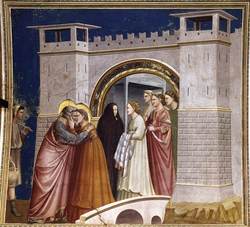
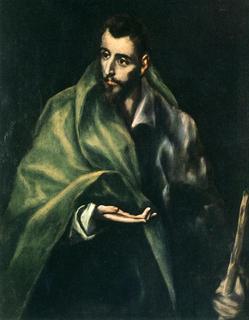
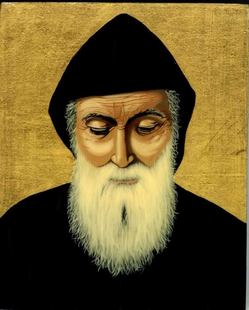
Every one who has left houses or brothers or sisters or father or mother or children or lands, for my name's sake, will receive a hundredfold, and inherit eternal life.
God our Father in Saint Sharbel Makhluf, You gave a light to Your faithful people. You made him a pastor of the Church to feed Your sheep with his word and to teach them by his example. Help us by his prayers to keep the faith he taught and follow the way of life he showed us.
Saint Sharbel Makhlouf (1828-1898) was
born in a small Lebanese mountain village who became, at 23 years old, a monk
of the Lebanese Maronite Order and later ordained a priest in 1859. He is known
for his intense devotion to lectio divina, the Eucharist and the Blessed Virgin
Mary. Sensing a deeper call in 1875, he began a solitary life (as a hermit) which
he lived for twenty-three years of his life. Sharbel's witness taught us
about the virtues of poverty, self-sacrifice, and prayer in world dominated by
an attraction to money, power and fame. Since July 24, 2004 Saint Sharbel has
been introduced the liturgical observance in the sacred Liturgy.
Archbishop Francis M. Zayek said of Saint Sharbel:
"Reading about the holy hermits of the desert, we used to consider many reported facts as mere fables. In the life of Blessed Sharbel, however, we notice that these facts are authentic and true. Blessed Sharbel is another Saint Anthony of the Desert, or Saint Pachomius, or Saint Paul the Anchorite. It is marvelous to observe how you, Maronites, have preserved the same spirituality of the fathers of the desert throughout the centuries, and at the end of the nineteenth century, 1500 years later, produced a Sharbel for the Church."
(The icon was painted by iconographer Christine Habib el Dayé. Other pieces of the artist's work can be seen here and she can also be found on Facebook.)
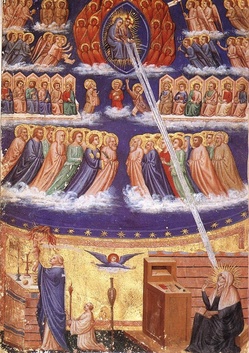 Lord, our God, you revealed the secrets of heaven to Saint Bridget as she meditated on your Son's Passion. Grant that we your servants may find great joy when your glory is revealed.
Lord, our God, you revealed the secrets of heaven to Saint Bridget as she meditated on your Son's Passion. Grant that we your servants may find great joy when your glory is revealed.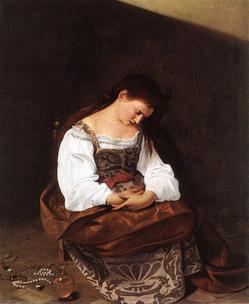 Early in the morning of the first day of the week, when Jesus had arisen, he first appeared to Mary Magdalene, from whom he had driven seven devils.
Early in the morning of the first day of the week, when Jesus had arisen, he first appeared to Mary Magdalene, from whom he had driven seven devils.An angel in the flesh, the foundation of the prophets, and the second forerunner of Christ, the glorious Elijah from on high sent grace to Elisha, to cure sicknesses & cleanse lepers. He likewise overflows with healing for those who honor him.
(Troparion of the feast, Tone 4)

Let all Christ's Church assemble here
And, gathered in His holy Name,
Keep solemn, joyful festival
To sing of great Elijah's fame.
Of all the prophets who foretold
God's hidden plan of saving grace,
He is the chief: to him we give,
The Tishbite, now the choicest place.
He called the folk of Israel
Back to their covenant with God;
Through kingly wrath and violence
God's narrow way of truth he trod.
When earthly tasks for him were done,
You called him in a special way:
A fiery chariot came for him,
Foretelling Christ's ascension day.
For all the graces You have giv'n
Through what Elijah did for You,
Your Church on earth gives endless praise,
O Father, Son, and Spirit true.
L.M. (88.88)
James Michael Thompson (2009)
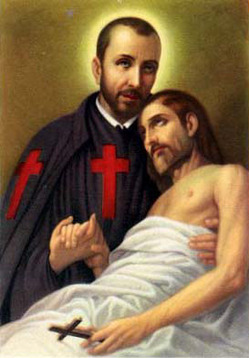
As the Father has loved me, so have I loved you; abide in my love. If you keep my commandments, you will abide in my love, just as I have kept my Father's commandments and abide in his love. These things I have spoken to you, that my joy may be in you, and that your joy may be full.
Father, you
gave Saint Camillus a special love for the sick. Through his prayers inspire us
with your grace, so that by serving you in our brothers and sisters we may come
safely to you at the end of our lives.
A bio on Saint Camillus
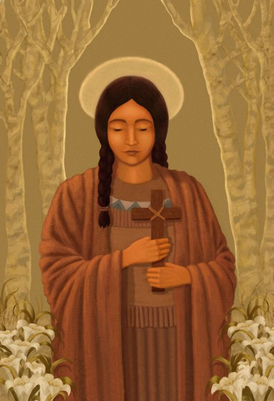
Lord God, you called the virgin, blessed Kateri Tekakwitha, to shine among the Indian people as an example of innocence of life. Through her intercession, may all peoples of every tribe, tongue, and nation, having been gathered into your Church, proclaim your greatness in one song of praise.
The National Shrine of Blessed Kateri Tekakwitha staffed by the Conventual Franciscans.

God our Father, You made Saint Benedict an outstanding guide
to teach men how to live in your service. Grant that be preferring your love to
everything else we may walk in the way of your commandments.
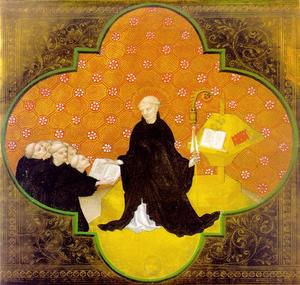
Famous for his work on the 12 degrees of humility, Saint Benedict proposes the following for those who want to advance in the spiritual life. The degrees of humility are given below.
The first degree of humility, then, is that a man always have the fear of God before his eyes (cf Ps 35[36]:2), shunning all forgetfulness and that he be ever mindful of all that God hath commanded, that he always consider in his mind how those who despise God will burn in hell for their sins, and that life everlasting is prepared for those who fear God. And whilst he guard himself evermore against sin and vices of thought, word, deed, and self-will, let him also hasten to cut off the desires of the flesh.
The second degree of humility is, when a man love not his
own will, nor is pleased to fulfill his own desires but by his deeds carried
out that word of the Lord which said: "I came not to do My own will but
the will of Him that sent Me" (Jn 6:38). It is likewise said:
"Self-will hath its punishment, but necessity win the crown."
The third degree of humility is, that for the love of God a
man subject himself to a Superior in all obedience, imitating the Lord, of whom
the Apostle said: "He became obedient unto death" (Phil 2:8).
The fourth degree of humility is, that, if hard and
distasteful things are commanded, nay, even though injuries are inflicted, he
accept them with patience and even temper, and not grow weary or give up, but
hold out, as the Scripture said: "He that shall persevere unto the end
shall be saved" (Mt 10:22). And again: "Let thy heart take courage,
and wait thou for the Lord" (Ps 26[27]:14).
The fifth degree of humility is, when one hides from his
Abbot none of the evil thoughts which rise in his heart or the evils committed
by him in secret, but humbly confesses them. Concerning this the Scripture
exhorts us, saying: "Reveal thy way to the Lord and trust in Him" (Ps
36[37]:5). And it said further: "Confess to the Lord, for He is good, for
His mercy endures forever" (Ps 105[106]:1; Ps 117[118]:1). And the Prophet
likewise said: "I have acknowledged my sin to Thee and my injustice I have
not concealed. I said I will confess against myself my injustice to the Lord;
and Thou hast forgiven the wickedness of my sins" (Ps 31[32]:5).
The sixth degree of humility is, when a monk is content with
the meanest and worst of everything, and in all that is enjoined him holds
himself as a bad and worthless workman, saying with the Prophet: "I am
brought to nothing and I knew it not; I am become as a beast before Thee, and I
am always with Thee" (Ps 72[73]:22-23).
The seventh degree of humility is, when, not only with his
tongue he declares, but also in his inmost soul believeth, that he is the
lowest and vilest of men, humbling himself and saying with the Prophet:
"But I am a worm and no man, the reproach of men and the outcast of the
people" (Ps 21[22]:7).
The eighth degree of humility is, when a monk doeth nothing
but what is sanctioned by the common rule of the monastery and the example of
his elders.
The ninth degree of humility is, when a monk withholds his
tongue from speaking, and keeping silence doth not speak until he is asked; for
the Scripture shows that "in a multitude of words there shall not want
sin" (Prov 10:19); and that "a man full of tongue is not established
in the earth" (Ps 139[140]:12).
The tenth degree of humility is, when a monk is not easily
moved and quick for laughter, for it is written: "The fool exalts his
voice in laughter" (Sir 21:23).
The eleventh degree of humility is, that, when a monk speaks,
he speak gently and without laughter, humbly and with gravity, with few and
sensible words, and that he be not loud of voice, as it is written: "The
wise man is known by the fewness of his words."
The twelfth degree of humility is, when a monk is not only
humble of heart, but always lets it appear also in his whole exterior to all
that see him; namely, at the Work of God, in the garden, on a journey, in the
field, or wherever he may be, sitting, walking, or standing, let him always have
his head bowed down, his eyes fixed on the ground, ever holding himself guilty
of his sins, thinking that he is already standing before the dread judgment
seat of God, and always saying to himself in his heart what the publican in the
Gospel said, with his eyes fixed on the ground: "Lord, I am a sinner and
not worthy to lift up mine eyes to heaven" (Lk 18:13); and again with the
Prophet: "I am bowed down and humbled exceedingly" (Ps 37[38]:7-9; Ps
118[119]:107)
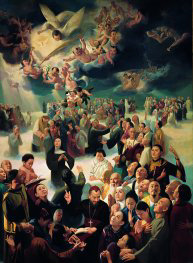
Father, we celebrate the memory of Saint Augustine Zhao Rong
and his companions who died for their faithful witnessing to Christ. Give us
the strength to follow their example, loyal and faithful to the end.
Saint Augustine Zhao Rong, a Chinese diocesan priest who was
martyred with 119 companions in 1815. Among their number was an
eighteen-year-old boy, Chi Zhuzi, who cried out to those who had just cut off
his right arm and were preparing to flay him alive: "Every piece of my
flesh, every drop of my blood will tell you that I am Christian."
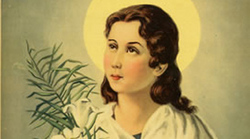 Father, source of innocence and lover of chastity, you
gave Saint Maria Goretti the privilege of offering her life in witness to
Christ. As you gave her the crown of martyrdom, let her prayers keep us faithful
to your teaching.
Father, source of innocence and lover of chastity, you
gave Saint Maria Goretti the privilege of offering her life in witness to
Christ. As you gave her the crown of martyrdom, let her prayers keep us faithful
to your teaching.